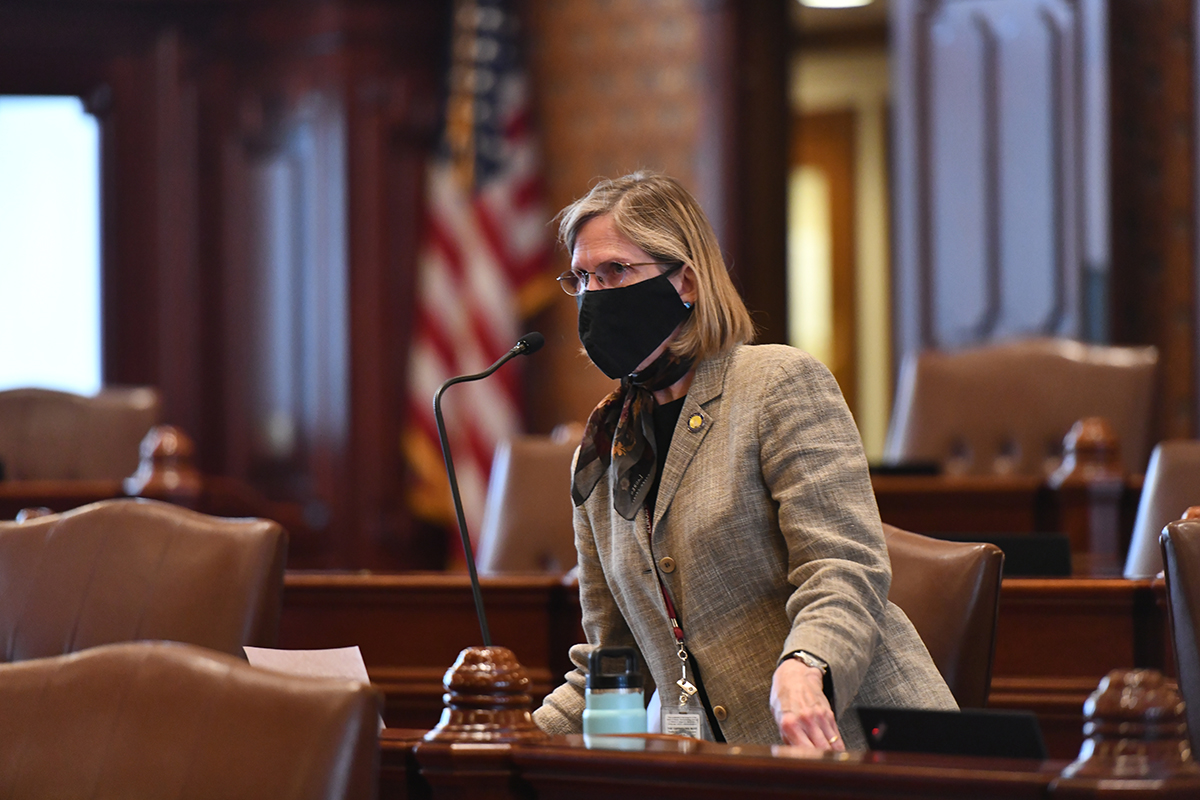Glowiak Hilton announces upgrades coming to local libraries
- Category: Press Releases
 OAKBROOK TERRACE – Patrons of nine libraries in the 24th Senate District will soon see upgrades to services thanks to more than $316,000 in grants, State Senator Suzy Glowiak Hilton (D-Western Springs) announced Wednesday.
OAKBROOK TERRACE – Patrons of nine libraries in the 24th Senate District will soon see upgrades to services thanks to more than $316,000 in grants, State Senator Suzy Glowiak Hilton (D-Western Springs) announced Wednesday.
“Libraries provide a safe space for residents to use a computer, check out a book or learn a new skill,” Glowiak Hilton said. “People rely on technology for work, school and everyday life—when they can’t access these resources at home, libraries can fill the gaps.”
The $316,086.62 received by nine local libraries is part of $18.1 million in grants awarded to 638 public libraries across the state. For more than 40 years, the Illinois Public Library Per Capita and Equalization Aid Grants Program has helped public libraries with a low library tax base to ensure a minimum level of funding for library services.
Libraries will use the grants from the secretary of state’s office to help fund new services and products, such as audiobooks, adult programming, dual language materials and more.
“State funding helps libraries continue to provide much-needed resources to the community,” Glowiak Hilton said. “Students, seniors and families will reap the benefits of these grants at their local libraries.”
The following libraries in the district Glowiak Hilton represents will receive funds:
- Clarendon Hills Public Library, $12,496.20
- Elmhurst Public Library, $65,078.48
- Glen Ellyn Public Library, $40,488.75
- Helen M. Plum Memorial Public Library District in Lombard, $64,000.25
- Hinsdale Public Library, $24,803.60
- Lisle Library District, $42,043.40
- Oak Brook Public Library, $11,627.43
- Thomas Ford Memorial Library in Western Springs, $19,138.13
- Westmont Public Library, $36,410.38
For more information on the grants, residents can visit the secretary of state’s website.
Glowiak Hilton to offer extended evening office hours in Oakbrook Terrace
- Category: Press Releases
 OAKBROOK TERRACE – To give more residents the opportunity to visit her office with comments and concerns, State Senator Suzy Glowiak Hilton (D-Western Springs) is extending her office hours to accommodate the schedules of busy parents and working families.
OAKBROOK TERRACE – To give more residents the opportunity to visit her office with comments and concerns, State Senator Suzy Glowiak Hilton (D-Western Springs) is extending her office hours to accommodate the schedules of busy parents and working families.
Glowiak Hilton’s Oakbrook Terrace office, located at 17W715 E. Butterfield Road, Suite F, will be open until 7 p.m. on Monday, Sept. 27 and Wednesday, Sept. 29. The office is typically open weekdays until 4:30 p.m.
“With the school year starting, my office will be available to offer direct help for residents, families and business owners needing to access recovery resources for an extended amount of time,” Glowiak Hilton said. “I encourage anyone who needs assistance, has ideas or just wants to talk to attend.”
Glowiak Hilton invites residents to visit her office for help accessing state services and to discuss legislative matters directly. Masks are required indoors.
Appointments are encouraged, but not required and can be made by calling (630) 785-3177.
Governor signs Glowiak Hilton plan to educate students on vaping risks
- Category: Press Releases
 SPRINGFIELD – To make sure students know the potentially life-threatening risks of vaping, State Senator Suzy Glowiak Hilton (D-Western Springs) created a new law to teach the dangers of e-cigarettes in school.
SPRINGFIELD – To make sure students know the potentially life-threatening risks of vaping, State Senator Suzy Glowiak Hilton (D-Western Springs) created a new law to teach the dangers of e-cigarettes in school.
“As e-cigarettes become more popular among children, Illinois has a responsibility to educate our youth on the dangerous, potentially fatal side effects,” Glowiak Hilton said. “In order to keep kids from developing harmful nicotine addictions, it’s critical to teach students about the proven health risks associated with vaping.”
Glowiak Hilton’s law expands Illinois’ current tobacco health curricula taught in elementary and secondary schools to include health concerns associated with e-cigarettes and other vapor devices.
“Vaping can be detrimental to development for teens and young adults,” Glowiak Hilton said. “Adolescents are vulnerable to tobacco companies’ deceitful marketing ploys, and adding to the school tobacco health curricula is a strong defense to prevent children from becoming addicted at an early age.”
House Bill 3202 is effective immediately and begins with the 2021-2022 academic year.
New law by Glowiak Hilton to aid local businesses
- Category: Uncategorised

“Local governments are capable of deciding what is best for the local business community’s financial future,” Glowiak Hilton said. “To provide support where it’s needed most, this law allows units of local government to determine where waiving fees would be beneficial to a struggling business.”
The law creates an option for counties and municipalities to waive licensing, permitting or registration fees for local businesses and services. To qualify, businesses must demonstrate financial need from the pandemic.
Counties and municipalities regulate businesses in a multitude of industries that may qualify, including bars, restaurants, construction, insurance, transportation, tourism and entertainment.
“Numerous industries have faced unique challenges over the last year and a half,” Glowiak Hilton said. “This proposal allows governments to offer relief to any local business that demonstrates financial loss.”
House Bill 2454 is effective immediately.
More Articles …
Page 35 of 68




